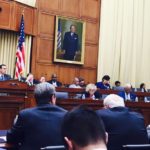 Washington — House Judiciary IP & Internet subcommittee chairman Darrell Issa opened Tuesday’s hearing titled “International Data Flows: Promoting Digital Trade in the 21st Century” by saying policies blocking data flows could lead countries to other unfair trade practices like demanding source code or trade secrets. He said restricting Internet data from flowing across national borders amounts to a non-tariff trade barrier which he called “protectionist.”
Washington — House Judiciary IP & Internet subcommittee chairman Darrell Issa opened Tuesday’s hearing titled “International Data Flows: Promoting Digital Trade in the 21st Century” by saying policies blocking data flows could lead countries to other unfair trade practices like demanding source code or trade secrets. He said restricting Internet data from flowing across national borders amounts to a non-tariff trade barrier which he called “protectionist.”
Ranking member Jerrold Nadler, D-NY, noted that Europe recently invalidated the safe harbor agreement allowing data transfers due to US surveillance saying, “It shouldn’t take a European court to prod us into protecting our citizens.” He said House passage of the Judicial Redress Act is a step in the right direction and said he hoped the Senate would take it up shortly.
In his testimony, Ed Black, President & CEO of the Computer & Communications Industry Association, praised the Committee for its work earlier this year on surveillance reform and said Senate passage of the Judicial Redress Act would be critical to restoring trust in the U.S. and serve as a way to show European Internet users the U.S. government is committed to reasonable privacy standards.
Black emphasized growth of digitally delivered services, citing a Brookings Institute study that estimated EU digital service exports as worth $140.6 billion to the U.S. and that the EU’s digitally delivered services exported to the U.S. amounted to $106.7 billion.
He said the European Court of Justice’s invalidation of the legal underpinnings of the EU-U.S. Safe Harbor Framework last month forces both U.S. and EU companies to find alternatives. “Current alternatives are costly, piecemeal and difficult to implement.”
Black also explained the issues related to the Safe Harbor were just the most recent of several digital trade barriers. He said Internet filtering and blocking continues to be a trade barrier along with data and infrastructure localization rules, intermediary liability risks and a lack of balanced proliferation of copyright limitations and exceptions abroad. “If you have intermediaries liable for what users do, we will have a crippling of the open Internet as we know it today.” He also described how Germany and Spain have enacted laws recently that make it difficult to quote text or return small excerpts of texts in search results, and explained how there is room under current trade laws to challenge these so-called “snippet taxes.”
During questioning from Rep. Zoe Lofgren, D-Calif., Black warned of the dangers of some countries banning links to news stories under so-called Right to Be Forgotten laws, saying that the hearing was examining data flows broadly, “but what about the ability to block information and the dissemination of knowledge?”
He closed out his testimony by explaining the need for cross border access to telecommunications services.